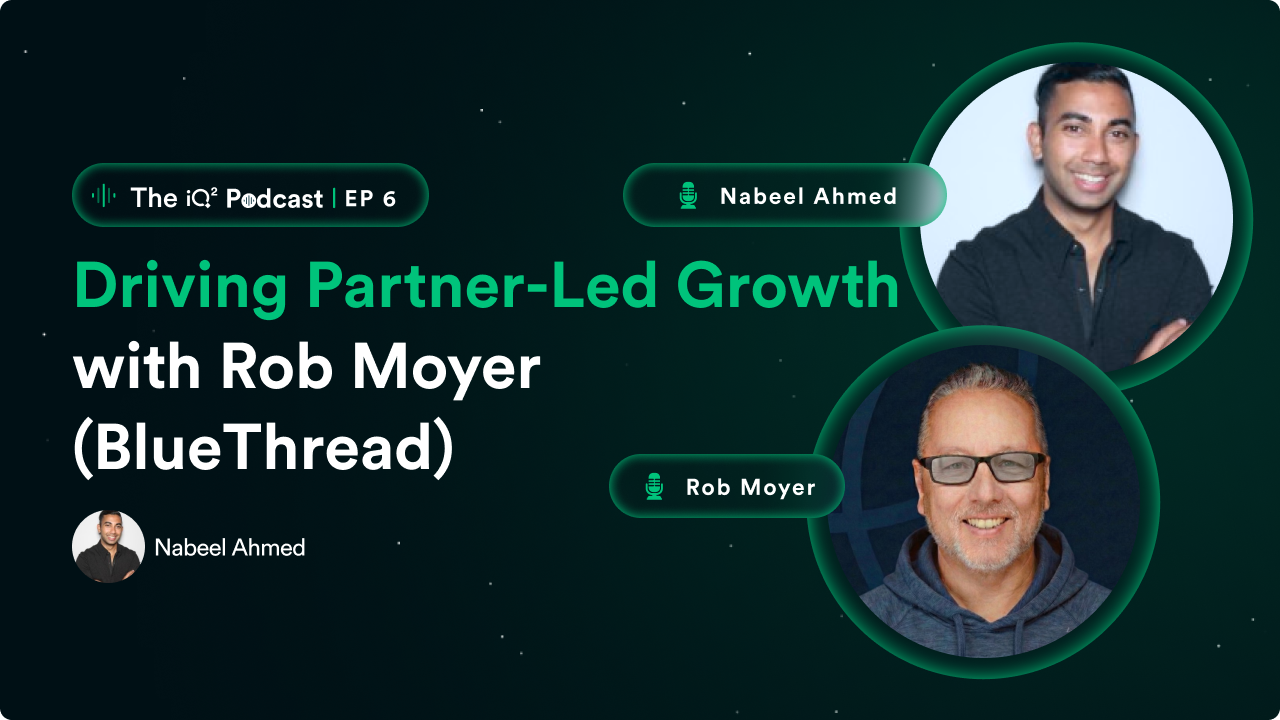Building High-Performing SDR Teams with Jessica Nelson
Jessica Nelson has nearly 20 years in sales development, leading teams from 3 to 50 across SaaS, InsureTech, and beyond. In this episode of iQ², she shares what it takes to scale teams, build a positive sales culture, manage CRO expectations, and coach SDRs into top performers.

Effective leadership combines clear communication and empowering teams

Success in sales isn't just individual; it's a team victory

Embracing AI can revolutionize prospecting and efficiency
Nabeel: Hey everyone. We've got another episode of IQ Squared with, I would say, probably one of the most tenured advanced elite sellers I know and sales development. Mrs. Jessica Nelson, you have about two decades worth of sales development, history, direct selling account management to running teams, to running revenue in multiple organizations, predominantly technology.
And correct me if I'm wrong, but it is an honor to have you here today. Having this conversation and understanding a little bit more about you and where you see the market, but before I ruin it, as I always do with any type of introduction, I would love to hand it off to you and you give all of our listeners a little bit of knowledge of who you are and how you came to be there.[00:02:00]
Jessica: Awesome. Thank you and thanks for having me. Give a quick background on myself. Um, and I guess how I got here, fun story. I started my career in hospitality and hospitality management because I loved it, loved the industry, and really thought that I wanted to like, manage groups of teams and events and it was gonna be super fun.
The thing they don't tell you about that is that it means you're working nights and weekends and you don't get paid a lot, so. I had a friend who got a job entry level sales, and she's like, this is so great, and you get benefits. I'm like, wow. Hospitality, no benefits, sales benefits. Threw my hat in the ring and ended up as a SMB seller at CareerBuilder for a little shy of a decade, so started calling into.
SoCal companies under 50 employees, right? In a very specific zip code radius that may need to post their jobs online. [00:03:00] Super fun, very easy. Like really, really chill sales, right? Like totally never getting objections on that. Um, worked my way up from there into enterprise. So selling like true enterprise sized companies and then decide to make a leap to a company to start managing teams.
So have had the opportunity to grow and lead, I think seven different teams building in different states of their growth in different segments of software and have had teams as small as, I guess, I guess I probably have the smallest team I've had in a while. Right now I have a team of three folks going on five and teams up to, I think 50 is the largest that I've had where a lot of them were by direct reports.
In anything from HR software to environmental health and safety software to APIs, which are very fun and very technically complex to right now I'm in [00:04:00] the awesome space of InsureTech and working with some of the largest insurance carriers in the world.
Nabeel: Well, thank you for that. I, I think managing from three people to 50 people on direct reports sounds.
Absolutely wild. I'm sure I'd be, you know, pulling all my hair out at that point when managing 50 people. How'd you survive? Especially when it comes to sales, in my opinion, a lot of handholding, psychology, support that you need to create an environment where they're excited about it, but 50 people. That's wild.
Yeah,
Jessica: and I, I guess technically it wasn't 50 direct reports, but a lot of them were direct reports. Probably the largest group of direct reports I've ever had was 18 with some of them having subsets of teams underneath, which is way too many, I'd say for any. New manager for any teams thinking about how they're layering in management, eight to 12.
12 is the absolute max that any [00:05:00] person can really do and be successful because to your point, you have a lot of different personality skill sets, things that people need, moving priorities and time management is critical in that. But making sure that your team has what they need to be successful is very hard.
The more people that you actually manage directly. So I think time management has always been, I, I think it comes from the event planning perspective of my background, but time management is critical. And then just being able to also allow people the space to do what they're really great at delegating things and letting things go even when you don't want to.
Nabeel: Yeah. Well I've, I've seen you work. Only at a glimpse and uh, I don't know how you can keep it all straight in your head and have enough time at the end of the day to even eat. Right. Um, so time management, I think
Jessica: eat between, eat between, uh, meetings. Very, yeah. You're eating and walking
Nabeel: to your next meeting at the end of the day, like, uh, off camera
Jessica: and you're taking a bite.
Nabeel: Yeah. I know we were talking about your crazy travel [00:06:00] schedule. Currently before this, so my assumption is those are your only windows for, for eating as much as you can so that you can actually just survive throughout the day. When it comes to meetings, it's a great segue because the question is extremely loaded.
Why do you do it? Like there's a lot of folks that I know that are in sales, I've been in SaaS for, you know, not even a third of of the time that you've been in, and it's. Burnout and I can't handle this anymore. You have showed tried like multiple times. It's just looking at your career through everything that you've done, the ability to execute, take a problem and grow it, achieve the revenue targets that are needed, and then typically.
Extracted from people that love working with you into another opportunity. So I just curious, like how do you manage it all and, and what, what do you love about the industry and the job role itself to kind of keep you moving?
Jessica: I'd say I [00:07:00] love, I mean, and I've always known this, like I love being able to grow.
And lead teams and show people how to become the best version of themselves. And I, I think that's a big piece of being a people leader and a sales leader, right? It's figuring out what someone's superpower is and then helping them really take that and build it into their day to day and see success that way.
I love seeing people who I've managed doing amazing things, right? Like leading teams themselves, selling million dollar deals, right? Like doing things where you're like, wow, I'm so glad I get to. I got to be a part of that person's path to get there. And I, I love building things. I like being given a problem space.
Generally, the teams that I've led were at some point in their maturity as a company, and they were looking to grow, scale, build, expand, build something with a foundation. And I, I love being able to take what I've seen succeed and then just different. Pieces of either knowledge or [00:08:00] technology and, and give those building blocks to make something where a company can really, uh, continue to grow and, and hit the goals that they're trying to get to.
Nabeel: So when you look at other companies or the companies that are providing opportunities, saying like, Hey Jess, come over here. Like, we'd love to have you. How do you evaluate them? 'cause it seems like the segments that you're looking at, like you've got a breadth of knowledge across multiple segments. So what are the key points that are interesting to you to say like, Hey, this is a company I wanna get my.
Hands in and help grow.
Jessica: I think there's two things, and I've been lucky enough to the companies that I've been at have this like magical mix. One is an amazing product that has a very addressable market. So if the TAM looks good and there's not a huge amount of competitors, or the competitors are like just so far off the scope and could easily just.
Not be there anymore. That, to me is great. So like a really, really amazing product that's going to be sticky, that's going to have like [00:09:00] interesting pieces behind it. That's doing something, like, doing something cool too because there's, there's a lot of things that a person can celebrate. Like anything that's around you, anything that's like on my desk or on your desk was sold to someone at some point and was part of a sales process.
I like things that are like very. Interesting and do something for either the world or the community or, or it's just like. Makes something better. And then having a really amazing leadership team. I've been super lucky to work with just amazing CROs, cgo, um, CEOs, CTOs who have a clear vision and a clear path of success that they are willing to invest in.
People invest in their teams. And give them what they need to be successful, as well as teaching them the things that they need along the way. So, so I think those are the two things there. Anyone who's ever looking at a company, they should think about, [00:10:00] okay, is this a product that I can be really proud and tell, like my friends, my family, everyone I know, this is something that I'm selling and I'm excited about.
And is this a leadership team where. They're inspiring me. They're doing amazing things, they're doing great things, and I am super happy to be with them.
Nabeel: It brings up a good point too. So product being sticky, I think a hundred percent, like I think a lot of people are evaluating that, and it's a unique way in evaluating that, that's taking face love, like level of the conversations that people are telling you and then actually using your eye to understand if that's true.
But number two is managing the CR. Right. I feel like you've been in, you know, the, the office of the CRO for a very, very long time. If anything, you know, sometimes even acting as one, uh, through proxy. And what's interesting about a lot of that is it's a skill in itself. Even if you have the full belief, the full latitude when it comes to managing and doing the things that you wanna do, it's still maintaining and having those conversations with [00:11:00] that CRO to make sure that they're up to speed, whether the problems that are coming up and, and what's moving forward.
I'm curious, how do you currently deal with that right now? And, and, and maybe it's not right now, or it could be just learnings that you've learned in the past. For anybody who's new to the management role of managing sales development or managing revenue teams, but still has to report into a CRO, what is your recommendation to them on how they should manage?
That CRO through their tenure,
Jessica: I would say having very clear and realistic expectations with them and having that constant stream of communication. So however they like to digest information, because each one will be different, right? Like do they like to see a quick update? On Slack, do they want an email readout?
Like what? What is the thing that will help them digest the information that you're trying to share very quickly. And then I think the other piece is having a really good level of transparency, [00:12:00] because I mean, at the end of the day, the truth is you're not always going to be able to hit your number. Some numbers are set as not aspirational, but they are set with a length of like how to get there.
The path is not always clear, so as long as you are transparent about where you are and you have a path to get there and you're doing what you can do to get there, then I, I think the CRO will always appreciate that and. Help you figure out what are the blocks, right? Because as a leader, whether you're a CRO, leading sales leaders, or if you're a sales leader, leading reps, or if you're, you know, a rep who's mentoring newer reps, the, the biggest thing is to be that block, but also like a block from issues that are coming down, whether it's.
Issues coming from the board or issues coming from different pieces of internal or external, but also to be the remover of blocks for the person [00:13:00] that is on that team
Nabeel: for you. Yeah. So
Jessica: I, I think that's key.
Nabeel: Yeah. And let me flip the question too, is what are some red flags that people should be watching out for?
When it comes to, not even just the CRO but management alone? That's
Jessica: a good question. I, I think someone who, you'll see it in most of the articles that talk about like different managers. I, I think a manager who isn't willing to like, roll up their sleeves and, and figure out the problem with you, yes, it's great to get the problem space, but if it's more of like, I'm gonna throw problems at you, but I'm not going to help you.
Unpack what are the issues, right? Like, okay, pipeline is low, this is a problem. Go fix it. Is a different way to pose an issue than we're not in these markets big enough, or these products are not getting enough attention. Like what are campaigns and how can I help you figure out what, what to do there? So I, I think someone who's not willing to [00:14:00] attack the problem and is just looking for someone who is going to solve the problem is, is likely going to be a challenge because it's all about collaboration, right?
I had a rep who once said to me. Sales is kind of like gymnastics where everyone can win a gold medal and then the team can win a gold medal like it's not one or the other. It really can be something where the team can all win. And everyone else can also win. So I think thinking about it in more so like we're all collaborating, yes, someone will likely be the top team or the top rep or or the top, whatever.
But there is a scenario where everyone can hit their quota, everyone can succeed. And it doesn't have to be like one person against the other.
Nabeel: Yeah, no, I love that. I, that, that analogy alone brings me back to my track and field days, right? Because I sucked at the 400 meter for anybody who's listening. Uh, and so I definitely weighed out that down the team.
But sales is different I think in that, in that sense. 'cause if you put in your reps, [00:15:00] you get your practice in. Actually, it's probably not different then you'll be, uh, you'll be good to go there. It's a great segue into my next conversation 'cause there's dealing with management. So I, the one difficult thing that I think in anybody who's in this position, especially the positions that you've held multiple times, is you've gotta, you know, deal with management and making sure that they're on speed.
But you also have to like dive very, very deep into the trenches to understand are your individual reps achieving everything that they need to do? To get done so that you roll it up to those gold medals. Right. What are some learnings that you see for yourself to kind of split your brain into understanding what types of conversations they need to have with individuals when it comes to inputs?
Maybe calls and emails and the way that they have conversations to how you can change that mindset when you roll it up to the top.
Jessica: Yeah, I, I think it, it is, it's really two different conversations because from a [00:16:00] individual and a rep perspective, what you're helping them figure out is not necessarily.
Why the deal's going to close or like why the next conversation's going to happen, but what are the blockers that might stop that from happening? Right? Because every rep, every C, they get off. They're like, this is great. This deal's gonna close. It's gonna make my year. It's gonna be amazing. So where you have to help the reps is helping them figure out, okay, you have a path to.
Authority, like you know who your coach is, you understand like what the legal process looks like, but outside of that, like what don't you know? And then when they know what they don't know, it's up to them to go back and figure out that information. And then, then you just keep pushing the deal down, right?
And then it's a rinse and repeat. Every time they have a new deal, it's like, okay, this is where I saw success. I'm gonna keep going after this type of company, this persona. I'm gonna use the same process over and over, very repeatable. Versus when you're bringing it to leadership, it's explaining because they're going to do the [00:17:00] same thing, right?
They're poking the same holes that you're poking in with the rep. So it's saying, these, this is why I believe that this is going to happen. These, this is where I've pressure tested all of the forecast, right? Like I, I'm gonna call this number based on these scenarios, and if these things happen and this all equals true, this is where we're gonna finish.
If these things happen and this goes badly, this is where we're gonna finish and if these better case things happen, we're gonna finish here. So having those three scenarios, but being able to say, these are the things that, if this happens, this is what will, like, this is where we'll finish, is where leadership I find generally responds well to your, like, reporting and readouts and, and where they.
Understand the forecasting.
Nabeel: Would you want a rep, uh, that understands that's the way you think when it comes to how you wanna report to management? Or do you wanna a rep just like get your head [00:18:00] down, get those deals, get those engagements moving forward?
Jessica: I, I think it's a combination of both because I, one of the things that when I was very early in my career, probably my first manager as a sales rep had said to me was, I just need you to be honest in your forecast, right?
Like with your deals, I just need you to tell me. Like what's actually happening and like be as transparent as you can be. Because I have to tell my boss, who then tells their boss, who then tells their vp, who then tells the CRO, right? Like I was way, way down the chain. Um, and when she explained it to me that way, I was like, oh, okay.
This is just for you to understand. So you tell them what you think and then they like put. Put on their thought cap and figure out, okay, this is what I am taking from this, and then everyone's gonna put in their like, piece of this I think could happen. This couldn't happen, but. I think for reps, it's understanding that it's not [00:19:00] like just be as honest as you can be about the deals.
Share as much as you know, because your manager is there to support you, to remove your blockers, and to help you find the ways to get it done. Not just to be like, this isn't in the right stage, or like, you're not in the right category. It's more so, okay, what are the blockers and how can I help you execute this deal?
So you get your commission right, because at the end of the day, the rep just wants. To close the deal, see success, get their permission.
Nabeel: Yeah, and you bring up a really good point because you, you talk about positive culture in that sense, right? The ability for somebody to be like, I feel comfortable with Jess.
Like I will tell her the truth and honesty, and I'm not worried about forecasting a large number to show how good I am or delay my eventual pip, right? Yeah. And that's really important 'cause that's hard to come by in a lot of environments now. I think with sales, especially over the past few years, things have gotten tighter, numbers have gotten [00:20:00] higher and teams have gotten smaller.
So it makes it difficult and, and what, what is happening and we, we see it all the time, like as much as we wanna say that we've got the best culture in the world, there are folks who are still afraid when it comes to their forecasting. And you take a bit of a haircut and sometimes more haircuts depending on the rep that is forecasting.
So when it comes to culture, how do you create that culture with the team, either remote or in office and in and different situations so that they feel comfortable coming to you with problems and honesty when it comes to forecasting?
Jessica: Yeah, and, and I think, I mean, it's first by leading with positivity, right?
And assuming positive intent and. Having them understand that you really are there to like help them with ideas, to give them the resources they need. And the more that they tell you that they need, you're going to advocate. Right? Is it if I have, if we have this feature that's [00:21:00] on our Q4 roadmap, if we get it into Q2, then I will likely be able to close this deal based on the conversations, right?
And then as a manager. Walking through those conversations with the rep and saying, okay, yep, I'm hearing the same thing. I'll go advocate for this with product. I'll explain this to the executive team and, and then seeing you actually follow through on things like that. And then I, I think one thing that has, I guess in the past, like few years or five years or however many years I've really taken as like something that I make sure the reps understand is like, just because it's a.
Jessica problem doesn't mean that it's a their problem, right? Like, it's amazing. You're getting promoted, you're going to a different team, right? You're not gonna be like, you're moving from an SDR to an ae. This is the most amazing thing. You need to be excited. Like you can't worry about the pipeline that you're not now creating for me, because that's a Jessica problem, right?
Like your, your success is [00:22:00] not contingent on me coming up with a solution to a problem, right? Like the overall number is not your problem to solve. That's a Jessica problem. Versus like, my role here is to figure out how to best get you to your quota, right? Like, let's figure out the path to get you to your number.
We have a whole year to do it. Let's see what those deals are, how can we do it quickly? And everything else outside of that for you as a rep until you. Decide you wanna be a manager. Like that is, that's your only world and focus. Everything else is a Jessica problem.
Nabeel: Yeah. Well, heck, we should, uh, we should get more people working for you.
'cause at the end of the day, the shit does not roll down the hill when you're there. Right. Yeah. Because you're shielding it, you're supporting. Hey, what makes sense, what doesn't make sense? And I'm having the right conversations with people who are doing well, and I'm having the right conversations with people who are doing poorly, uh, and you letting them know where they are.
And I love that. Uh, moving forward, just 'cause I know we're, we're, we're hitting time for [00:23:00] anybody who's listening specifically when it comes to becoming a, a sales rep or, or getting into, um, an SDR or BDR role, how is the market changing in what you're seeing? Uh, and how is, how has that role evolved to where skills need to be changed or adapted to be successful in it today?
Jessica: Yeah, I think it's interesting because there is a period of time, right, where we were obviously very zoom heavy. A lot of people are still like highly zoom heavy, maybe have never been in an office, haven't necessarily like, had people on calls. I'd say there's a few things right. Number one, if you don't listen to anything else, for whoever's listening at this moment in time, AI is your friend.
Figure out how to use it. Figure out how to make your day faster. It like don't run away from it. It is amazing. It will help you prospect better. It will help you do emails better. It will guide [00:24:00] you in ways. And help you poke holes in how you're doing some of that, like top of funnel work that you never would've thought of.
But I I think it's specifically for like sdr, BDRs, XDR is whichever they're gonna be. If you, and, and I've said this to. Countless SDRs who are like new in their career and thinking, okay, this is, now I'm ready to step into an account executive role. The biggest thing for you to master is figuring out how to be succinct, clear, and very crisp in your discovery and on phone calls.
Because at the end of the day, account executives spent a ton of time on phone calls, whether it's discovery, demo, negotiation, right? Five hours on a legal call with a giant company because that's how they run their deals. You have to be able to be very crisp, understand how you're going to present your product and get someone to believe in you throughout every step.
So I think any SDR [00:25:00] that feels like, and I, I get it, cold calling is really hard and isn't always as successful as like a LinkedIn or email. Right? It's, um, but the benefit, it will. Give you, as you progress your career and as you move into an account executive and as you move into leadership, whatever path you decide to go down, you need to be able to be very, very crisp on the phone and have those conversations.
And the faster you can master that, the easier your path is going to be to move into any of those other roles.
Nabeel: Yeah, I, you know, I can't agree more with that statement. Even here at, at Lead iq, we're a massive outbound. Heavy organization where our, uh, SDRs are probably the only reason why we do well. Right.
Um, and it's because they have the ability to kind of get rid of that fear very early on in their career by just putting the reps in as much as possible. [00:26:00] So we have a, a theory seek failure, and if you can seek failure enough. The definition changes, and so it's a, it's a beautiful thing. Um, Jess, thank you so much for joining us on this episode of IQ Squared.
I want everybody, regardless if they're running revenue teams or you're a sales rep that's been tenured in the industry or looking to join. To reach out to Jessica at Lead iq. We do have her mobile number. I can give that to you too for anybody who's listening. Just kidding. Sure. But for
Jessica: anybody, I mean, I would, I would love to see like any SDRs who are trying to sell something and I'm on your list, feel free Nabe able to give you my number and I like, leave me a voicemail and I'll take a meeting.
Nabeel: I love that. Yeah. So if anybody wants to reach out to Jess. Shoot her a LinkedIn message. We'll tag her, add her on LinkedIn, have conversations with her and anybody who's looking to optimize their revenue teams or understand just having a conversation. I think you're the person to talk to.
Jessica: Well, thanks.[00:27:00]
Nabeel: This has been wonderful. Well, thank you so much. We'll chat soon.
Jessica: Alright.
Meet the Guests


Jessica Nelson has nearly two decades of experience in sales development. Jessica has led SDR and revenue teams at companies like Stream, LeadIQ, Nylas, Sphera, and now serves as Director of Growth at Hi Marley. She's built and scaled teams from 3 to 50 people, and is known for building strong sales cultures and turning early stage chaos into growth.















